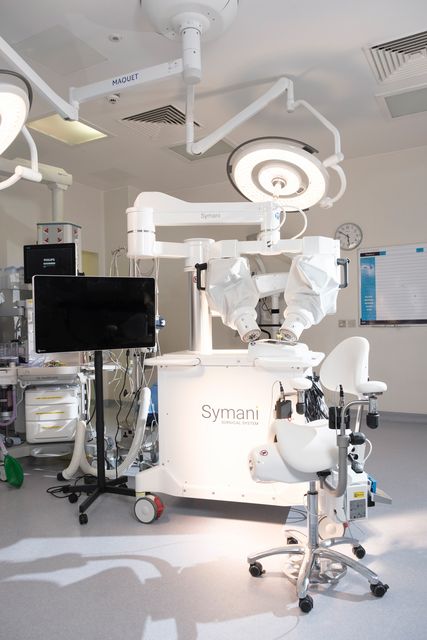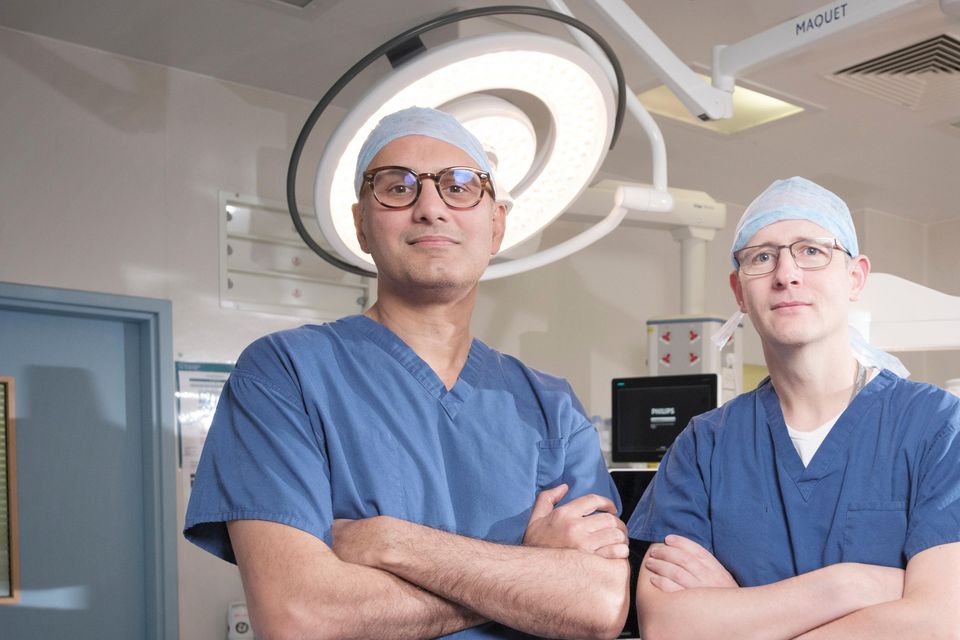An avid golfer who dismissed signs of cancer as a mark from his golf bag has become the first patient in the UK to have robotic microsurgery.
Nick Lees, 47, from Godalming in Surrey, eventually sought help after seeing news articles surrounding the King’s cancer diagnosis.
He then discovered that he had a rare type of skin cancer “the size of two 50 pence pieces”.
Medics needed to urgently remove the cancer.
And to aid the reconstruction of the tissue and vessels which were damaged during the cancer-removal procedure, they used robotic-assisted microsurgery – the first time it has been used in the UK.
The robot can replicate the natural movements of the human hand at the micro-scale.
Experts at the Royal Marsden hospital in London hailed the success of the operation – saying how surprised they were that Mr Lees was able to return to work just weeks afterwards.
The Symani Surgical System is a teleoperated robotic tool designed for microsurgery – a highly specialised technique where surgeons repair tiny anatomical structures such as blood or lymphatic vessels, or nerves (Dom Tyler)
Mr Lees, an estate agent, told the PA news agency: “I had a mark that had been on my chest for a while.
“It appeared, and it wasn’t causing me any discomfort, so I got used to it.
“I kind of assumed that it was because I played golf regularly, I carry a golf bag, and the strapping and sort of caused this sort of marking.
“But around the time King Charles was having his cancer treatments, there was a lot of coverage about it.
“I thought: ‘Oh, OK, I better go to the doctor’s.’
“So, went to the GP, she didn’t think it was anything, but said to get it checked out.
“So, I went to see this dermatologist, and they did a biopsy, and then they called me back in and said: ‘Look, unfortunately, it’s revealed you’ve got this sort of rare form of sort of skin cancer.’
“I was pretty taken aback, that was last thing I was expecting her to say.”
Aadil Khan and Kieran Power from The Royal Marsden said they are ‘excited’ by the potential of the surgical tool (Dom Tyler)
Mr Lees was diagnosed with dermatofibrosarcoma protuberans – a rare type of soft tissue sarcoma – in his chest.
Sarcoma is a type of cancer that develops in the body’s connective tissues including fat, muscle, nerves and blood and lymph vessels.
Mr Lees was referred to the world-renowned cancer hospital where he was under the care of consultant surgeon, Professor Andrew Hays, and consultant plastic and reconstructive surgeon Aadil Khan.
The procedures took place in November last year and now Mr Lees has since been given the all-clear.
The Royal Marsden Cancer Charity funded a UK-first robotic-assisted microsurgery system, called Symani Surgical System.
Mr Khan told PA: “The Symani system is the first open microsurgery robotic system that’s been developed in the world, and we are the first hospital in the UK to have it.
“Traditionally, when we used to do microsurgery, we would look down a microscope and we would manually use stitches to connect blood vessels together in order to perform these microsurgical reconstructions for patients who are having cancer treatment.
“What the Symani system now does is that it has robotic arms which take over that connection of blood vessels.
“So the surgeon sits remotely from the patient, looking at a screen in the same way that other robotic surgery is performed, and I have controllers in my hand that allow me to control the arms of the robot.
“And so we are now able to connect blood vessels of up to half a millimetre in diameter together very precisely and very kind of accurately using the robot.
“The technology itself means that it kind of eliminates the tremor at when you’re working at particularly very, very small levels, so your connections are much more precise and much more accurate.”
He went on: “Because we have greater reliability around connecting blood vessels of a smaller calibre than we did before… it’s better for the patient in terms of recovery, mobilisation and healing after surgery.”
Researchers at the hospital are now studying the effectiveness of the tool to see whether it could bring wider benefits to the NHS across the country.
Mr Lees added: “I feel quite honoured that they asked me to be the first patient.
“Obviously, when the surgeon first mentioned it, I was not too sure, but then I went away and thought about it and just felt that I’m in safe hands, I have a good relationship with the surgeon and everything had been first class in terms of how I’ve been sort of looked after at the Royal Marsden, so I had complete confidence in them.
“I also felt that I could do something that might help them, and also then others that come after.”
Mr Khan added: “For Nick, we were able to do a slightly less invasive procedure.
“And actually, when I saw him in clinic, he had gone back to work and that was quite significant, because I didn’t think he would be back at work as soon as he had been, but within weeks after surgery, he was, he was back to his job.
“He’s had a great result. He’s had a great outcome. And he’s cancer free.”
Mr Kieran Power, head of the plastic surgery unit and consultant plastic and reconstructive surgeon at The Royal Marsden, said: “We are hugely excited by the potential of Symani and the possibilities it offers patients in terms of faster recovery, less pain and improving quality of life following surgery.”
Antonia Dalmahoy, managing director of the Royal Marsden Cancer Charity, said: “We are delighted that the Charity’s funding has made it possible for The Royal Marsden to pave the way in improving cancer treatment and care, for the benefit of patients right across the UK and around the world.”

